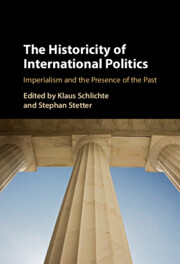Book contents
- The Historicity of International Politics
- The Historicity of International Politics
- Copyright page
- Contents
- Figures
- Contributors
- Acknowledgements
- Introduction
- Part I The Imperial Past and Present in International Politics and IR
- 2 The Colonial Origins – and Legacies – of International Organizations
- 3 Collective Hegemony after Decolonization
- 4 The Historicity of State Formation
- 5 Privateering, Colonialism and Empires
- 6 Where Did the Mongol Empire Go?
- 7 Where Would We Be without the Fog Lifting in Austerlitz?
- Part II Historical Sociology and the Imperial Fundaments of International Politics
- Part III Global History and the Imperial Fundaments of International Politics
- Conclusion
- Index
- References
7 - Where Would We Be without the Fog Lifting in Austerlitz?
Ruminations on the Uses of History and Sociology in IR
from Part I - The Imperial Past and Present in International Politics and IR
Published online by Cambridge University Press: 29 June 2023
- The Historicity of International Politics
- The Historicity of International Politics
- Copyright page
- Contents
- Figures
- Contributors
- Acknowledgements
- Introduction
- Part I The Imperial Past and Present in International Politics and IR
- 2 The Colonial Origins – and Legacies – of International Organizations
- 3 Collective Hegemony after Decolonization
- 4 The Historicity of State Formation
- 5 Privateering, Colonialism and Empires
- 6 Where Did the Mongol Empire Go?
- 7 Where Would We Be without the Fog Lifting in Austerlitz?
- Part II Historical Sociology and the Imperial Fundaments of International Politics
- Part III Global History and the Imperial Fundaments of International Politics
- Conclusion
- Index
- References
Summary
The chapter looks at the long-term structural importance associated with Napoleon’s win in Austerlitz and the ensuing formal end of the Holy Roman Empire. It defines modes of transformation but rather as evolutionary dynamics that pave the way for historical trajectories in which new social forms – such as European global empires or even the notion of global empire – borrow from previous forms, such as the way of organizing political authority in the Holy Roman Empire. In doing so, it identifies two pertinent modes of historicity, namely the presence of several temporal layers in social and political phenomena (‘complex temporalities’), as well as an evolutionary account of non-linear change. In this sense, the chapter is not only about the presence of a specific past in the contemporary structures of the system of world politics, but also to provide a methodological input into contemporary debates about global historical sociology.
- Type
- Chapter
- Information
- The Historicity of International PoliticsImperialism and the Presence of the Past, pp. 138 - 156Publisher: Cambridge University PressPrint publication year: 2023



